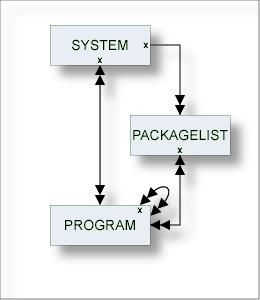The Predict object type Packagelist is used to document DB2 packages.
In the predefined Predict metastructure, a packagelist can have passive and active associations of the following types:
| Valid passive association: | "Contained in SY" |
| Valid active association: | "Uses PR" |

Note:
Packagelists of type T and packagelists of type S are related using
the parameters Collection name and Location name.
This document covers the following topics:
The following screen is displayed with function code M and object code
PG in a Predict main menu or the command MAINTAIN
PACKAGELIST.
13:47:47 ***** P R E D I C T ***** 2007-05-31
Plan 0 - (PG) Packagelist Maintenance - Profile HNO
Function Function
A Add a Packagelist D Display Packagelist
C Copy Packagelist L Link children
M Modify Packagelist S Select Packagelist from a list
N Rename Packagelist
P Purge Packagelist
Function .........
Attributes..........*
Packagelist ID ... Packagelisttype ....*
Copy ID ..........
Contained in SY ..
Restrictions .....* Profile HNO,used Association.........*
Command ===>
Enter-PF1---PF2---PF3---PF4---PF5---PF6---PF7---PF8---PF9---PF10--PF11--PF12---
Help Menu Canc S-fi E-el M-pr Print Impl Last FLIP PROF Next
|
| Parameters | |
|---|---|
| Function | Executes one of the maintenance functions. Standard maintenance functions are described in the section Maintenance in the Predict Reference documentation. The function Purge is described in the section Purge Packagelist - Code P. |
| Packagelist ID | Identifier of the Predict packagelist object. See Naming Conventions. |
| Packagelist type | See Packagelist Types below. |
| Copy ID | For Copy function: ID of the packagelist to be created. |
| Contained in SY | In DB2, packagelists are used by application plans. Applications plans are documented in Predict with objects of type system, subtype P. Hence the attribute "Contained in SY" is used to document by which plan a packagelist is used. |
| Association | For function Link children: Objects are to be linked to the packagelist via the selected association. Valid values: "Uses PR" and user-defined. |
The table below contains a list of all valid packagelist types.
| Code | Packagelist Type |
|---|---|
| Q | Database request module (DBRM). Packagelists of type Q contain one DBRM which is directly bound to the plan. |
| S | Subcollection. Packagelists of type T and packagelists of type S are connected using the parameters Collection name and Location name. Each package in a packagelist of type S is also contained in a packagelist of type T. |
| T | Total collection. Packagelists of type T provide an overview of all packages used in a collection. The parameters Collection name and Location name are mandatory for packagelists of type T. |
The screen is displayed for the Add a Packagelist function. The Copy and Modify screens are similar.
09:45:26 ***** P R E D I C T ***** 2007-05-31
- Add a Packagelist -
Packagelist ID .. HNO-PG
Type ...........*
Contained in SY *
Keys .. Zoom: N
Packagelist attributes
Collection name ...
Location name .....
Abstract Zoom: N
Additional attributes ..* N Associations ..* N
|
Predict ensures the consistency of related packagelists (types T and S):
If a package is purged from a packagelist of type T, it is purged automatically from corresponding packagelists of type S.
If a package is added to a packagelist of type S, it is added automatically to the corresponding packagelist of type T.
Note:
Parameters not listed here are described with the
Packagelist Maintenance menu in the section
Packagelist Maintenance
Menu.
| Parameters | |||
|---|---|---|---|
| Packagelist attributes | |||
| Collection name | From version 2.3 of DB2 and above, packages are always referenced via collections. A collection is a virtual summary of packages, used to simplify references to packages. In Predict, collections are documented as attributes of packagelists. Packagelists are grouped by including several packages to the same collection. A collection is documented in Predict with the attributes collection name and location name. A collection name can be up to 18 characters long. | ||
| Location name | Together with collection names, location names identify collections uniquely. A location name can be up to 16 characters long. | ||
| Association: Uses PR |
|
||
The following rules apply:
If you confirm this function with
DELETE, the following objects are deleted:
the packagelist object
all links to child objects
all links from parent objects
With packagelists of type T, all packagelists of type S connected to the packagelist via the attributes Collection/Location name are deleted as well. You must enter an additional confirmation before deleting these additional objects.
"Contained in SY". System to which the packagelist is linked.
09:50:10 ***** P R E D I C T ***** 2007-05-31
- List Packagelist -
------------------------------------------------------------------------------
Cnt Packagelist ID T Collection Location
1 AMA-PG1 T DSDS ERE
2 AMMMM T CVXCV XCVXC
3 ARH-PA-1 T COLL LOC
4 ARH-PA-2 T COL LOC
5 BA-PG T JKJ KJKKK
|
| Meaning of Columns | |||||||||
|---|---|---|---|---|---|---|---|---|---|
| T |
|
||||||||
| Collection | Collection of the packagelist. Packagelists of type T and of type S that belong together have the same collection and location name. | ||||||||
| Location | Location of the packagelist. Packagelists of type T and of type S that belong together have the same location and collection name. | ||||||||
The output options valid for this object type are identical to those for object type dataspace. See Output Options for Dataspace Retrieval.